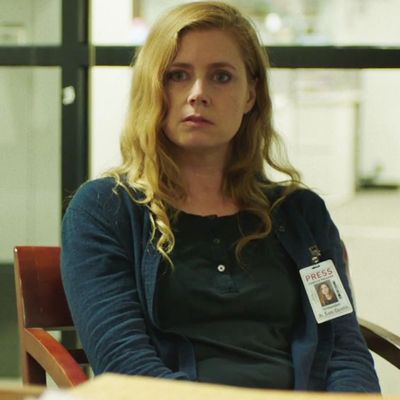
In the second episode of HBO’s Sharp Objects, there’s a moment when Amy Adams, playing intrepid reporter Camille Preaker, pulls up to a woman on the side of the road and conducts an impromptu interview. The older woman tells her that she’s taking down posters featuring the face of Natalie Keene, the abducted girl who recently turned up dead in Wind Gap, Missouri. The woman explains that she doesn’t want Natalie’s mother coming into town and seeing the face of her daughter plastered all over every flat surface. She adds, “I did the same for Ann,” another young girl from Wind Gap who was murdered ten months earlier.
The journalist in me thought, “What a sad story, but at least this’ll be great color for Camille’s article about how these murders have rattled the town.” You know, the whole reason she has returned to her hometown and the mother she hates. But then Camille does something shocking: She says, “Have a nice day,” and just drives off without taking any notes. What? She didn’t even pull out her notebook to ask this woman how to spell her name, where she lives, and what her age is — all of the information that any good editor will ask for when she files her story. How can she even include this amazing detail now?
I know that Camille is a mentally unwell alcoholic who doesn’t even remotely have her life together, but this is something that she would have learned at her first city council meeting as a cub reporter. You need to record everything, spell people’s names correctly, and take notes so that if you forget any details when you sit down to write your story (or if someone accuses you of making things up after it’s published), you have a record of what went down. Her boss Frank Curry has faith she can do this job, so she couldn’t have proven herself totally inept in the past, right?
It’s not until the third episode that Camille even bothers to pull out a tape recorder. She interviews Ann’s father Bob Nash for the first time without taking any notes. She talks to the Wind Gap police chief Bill Vickery and Kansas City detective Richard Willis several times without even jotting down a “No comment.” Even when she does record her second interview with Bob Nash, and her interview with Natalie’s brother John, both conversations end after just a couple of questions. Good luck getting a source to talk if you can’t even get past question three. (Also, John might be a minor without parental consent, so Camille probably shouldn’t be printing his quotes anyway.) Also, when she goes snooping in Natalie’s room, she doesn’t take a picture with her phone to remember what it looks like. She was half in the bag when she was there, too, which certainly doesn’t help.
Yes, there is something to be said for a (sober) reporter being in the moment and keeping her nose out of a thin spiral notebook long enough to observe what’s happening, but there is also something to be said for diligently taking notes. At Natalie’s funeral, for example, Camille isn’t taking notes — she’s just jotting down questions for herself to remember later. How can she listen to the sermon and record a few details about the church and the pastor when she’s not even listening? Eventually, Camille’s mother Adora steals her pen to get her to stop jotting during a funeral. What kind of reporter would let that get her down? She should have taken out her cracked-screen iPhone and typed in the Notes app like any real millennial journalist. Get it together, Camille.
You might forgive Amy Adams for playing one bad reporter — especially one who is supposed to be a mess — but this is her second time playing the world’s worst journalist outside of an Infowars segment. Remember Lois Lane in the Superman movies? The first time we see her in Batman v Superman, she’s dragged out into the desert to interview a terrorist. She pulls out her notebook, sits down, and asks her first question: “Are you a terrorist?” As the guy answers, she does nothing to get his words down. She wrote down simple questions so she wouldn’t forget them, but does she really expect to remember his answer verbatim for her Daily Planet story?
Lois, at least, is an excellent investigator: In Man of Steel, she tracked down Superman’s real identity by talking to people he worked with at the IHOP and whatnot. Still, like Camille, she wings it when it comes to the facts. Lois also allows herself to get scooped multiple times by rival media outlets, even while she’s in the midst of the story. Sure, she’s also trying to survive a cataclysmic attack from General Zod and probably doesn’t have time for professional standards. But Lois has other problems as well: There is no way that she should be reporting on Superman in the second film considering, you know, the fact that she bones him in a bathtub. This is a giant conflict of interest! Even if she doesn’t want to ruin Superman’s identity, she should recuse herself from any stories about him.
The same thing goes for Camille. She is getting way too close to her story, specifically Detective Willis, who’s been carousing with her all over Wind Gap. She needs to build trust with her source and form a relationship with him to get information, but flirting with the dude and getting drunk after hours isn’t exactly an ethical way to go about doing it. Also, if it turns out that someone in her family is the one who killed those girls — my money is on her stepdad Alan — it’ll be really hard for her to write an unbiased account for her newspaper.
Now, you might say that both of these are extreme circumstances. Sure, most reporters don’t have to cover serial-killer investigations or alien invasions. These ethical questions are extremely unusual. But Amy Adams has had to deal with them twice. Can’t we at least get a real reporter to give her a class on how to act like one?


